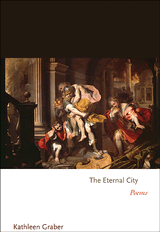 Each day leading up to the March 10 announcement of the 2010 NBCC award winners, Critical Mass highlights one of the thirty-one finalists (to read other entries in the series, click here). Today, NBCC board member Craig Morgan Teicher discusses poetry finalist Kathleen Graber's The Eternal City: Poems (Princeton University Press).
Each day leading up to the March 10 announcement of the 2010 NBCC award winners, Critical Mass highlights one of the thirty-one finalists (to read other entries in the series, click here). Today, NBCC board member Craig Morgan Teicher discusses poetry finalist Kathleen Graber's The Eternal City: Poems (Princeton University Press).
This is the second time I’ve had the pleasure of writing about Kathleen Graber’s The Eternal City and naming it one of my favorite 2010 books of poetry–I wrote about it for Publishers Weekly at the end of the year when we named it among our top 2010 books.
Graber’s book––this is her second––is one of the few to come out in 2010 that has joined the little clutch I have of poetry books I read and reread. It’s an unusually wise and sturdy book for a poet whose career is so young. Of course, Graber started later than most poets––she is now in middle age––so she brings what her lifetime has taught her to what she knows about art in poems like “No Lightsome Thing,” which blends the quotidian with a slight suggestion of elevated diction and a gentle touch when it comes to the weight of the past on the present, and shows compassion and curiosity in equal measure:
This is the year my friend has devoted to documentary theater,
a play about Christians. When one character tells another
it’s hard to live in the end time, the audience laughs.
I don’t know enough to name the plants I’m seeing.
I can’t say if they’ve bloomed here just the same
for a hundred or a thousand Novembers past.
The farm cat’s stomach is distended. And that’s likely
a bad sign, not pregnancy but something malignant,
lymph seeping into someplace it shouldn’t be.
Perhaps some urgent action would make a difference,
but it hardly knows me & there’s no one else around.
I can’t imagine how I’d trap it in order to take it off
to be seen.
Graber isn’t a formal innovator, nor is her subject matter––family, love, friendship, death, and the great books of classical literature––new to poetry, but she is nonetheless an absolute original. She borrows Ashbery’s habits of mind––thinking all the way through a concern, from beginning to further than the ending seemed it could take the poem––without borrowing his sly disjuntiveness; she is a very distant cousin to her poetic peers (other poets with second or third books), but clearly from the same family.
But she is an older kind of poet. The fat columns in which she casts most of her poems remind one, or seem to bow toward, fellow through-thinkers like, well, Milton and Shakespeare. But she is also thinking back to classical philosophers, whom she often quotes, who worked out their thoughts aloud; later transcriptions of those workings-out are the basis for Western literature, and, alongside Ashbery, those are the sources Graber wants us thinking about when we read lines like these in her poems: “I cannot tell the inherited/ from the found, the legacy from what I have bred from it.”
Which is not to say she is by any means a grandiose poet. She’s more of a very smart friend. Her problems are common––how to get along with others, how to make everyday love last and/or hurt less, how to have fun in the midst of a typically difficult life––and her poems offer, if not solutions (for there really are no solutions, are there?), company, and really good reading.
Kathleen Graber's home page at the Poetry Foundation can be accessed by clicking here. Click here to see a video of Graber reading from The Eternal City; an excerpt can be found here.


